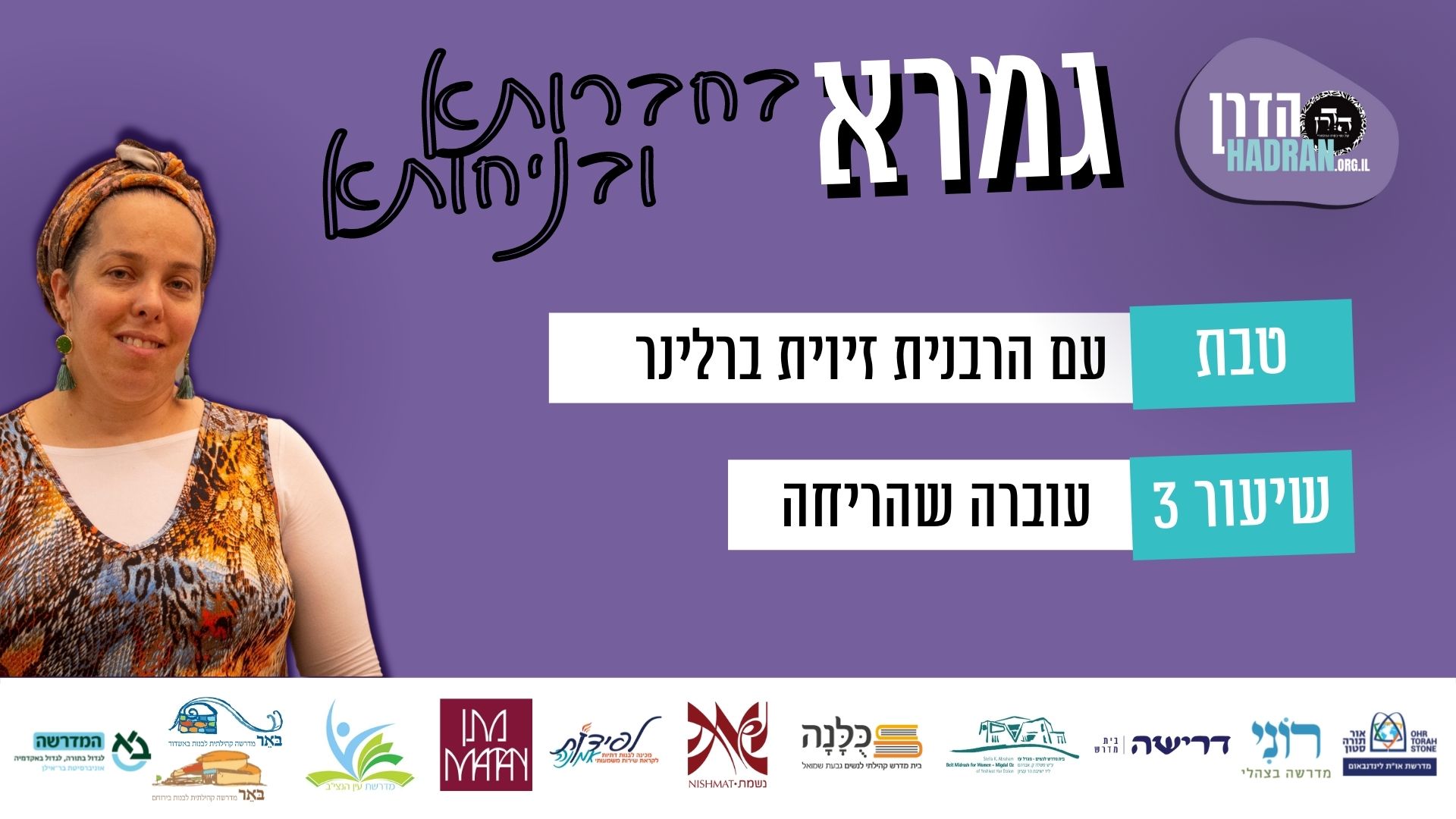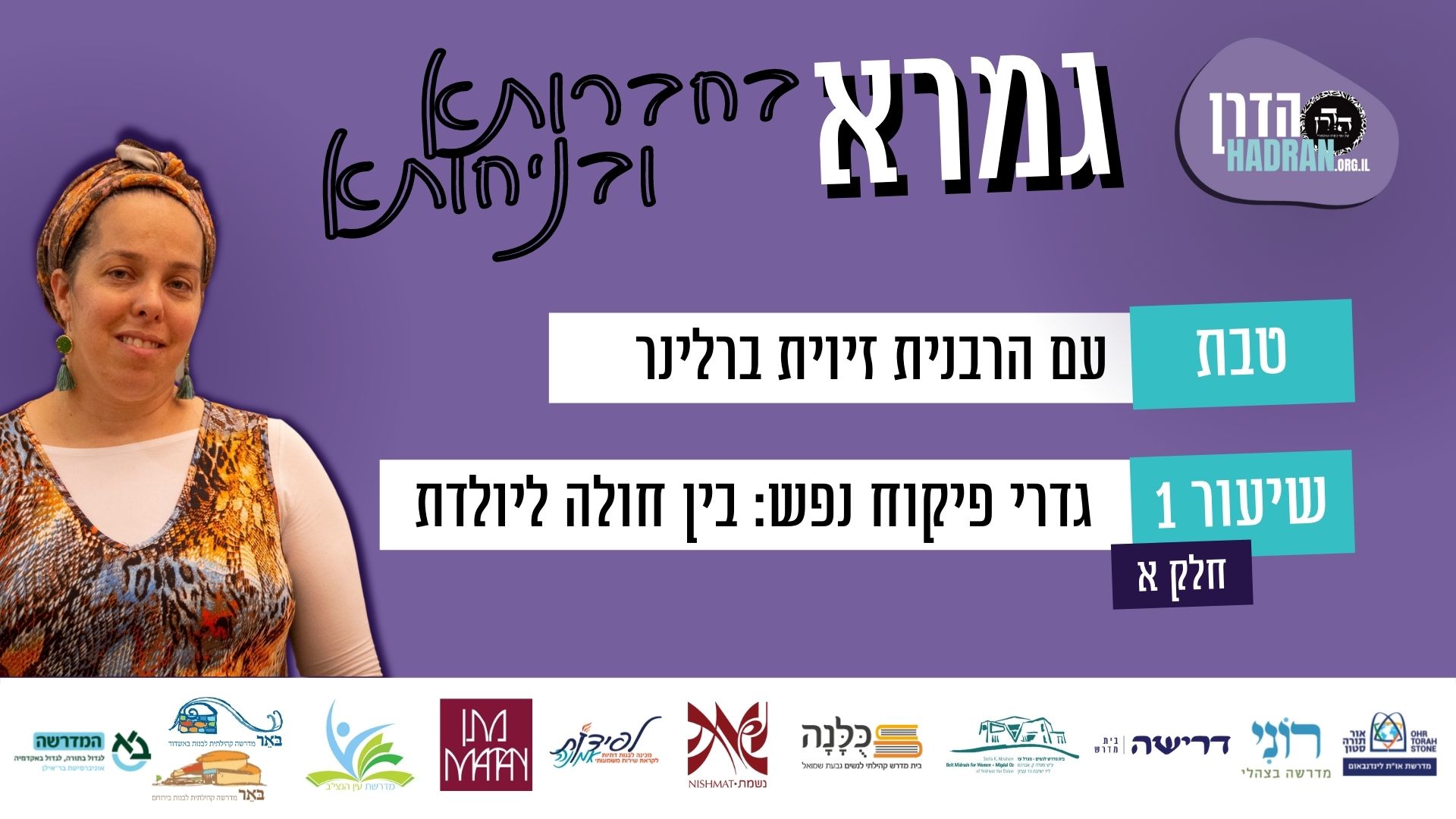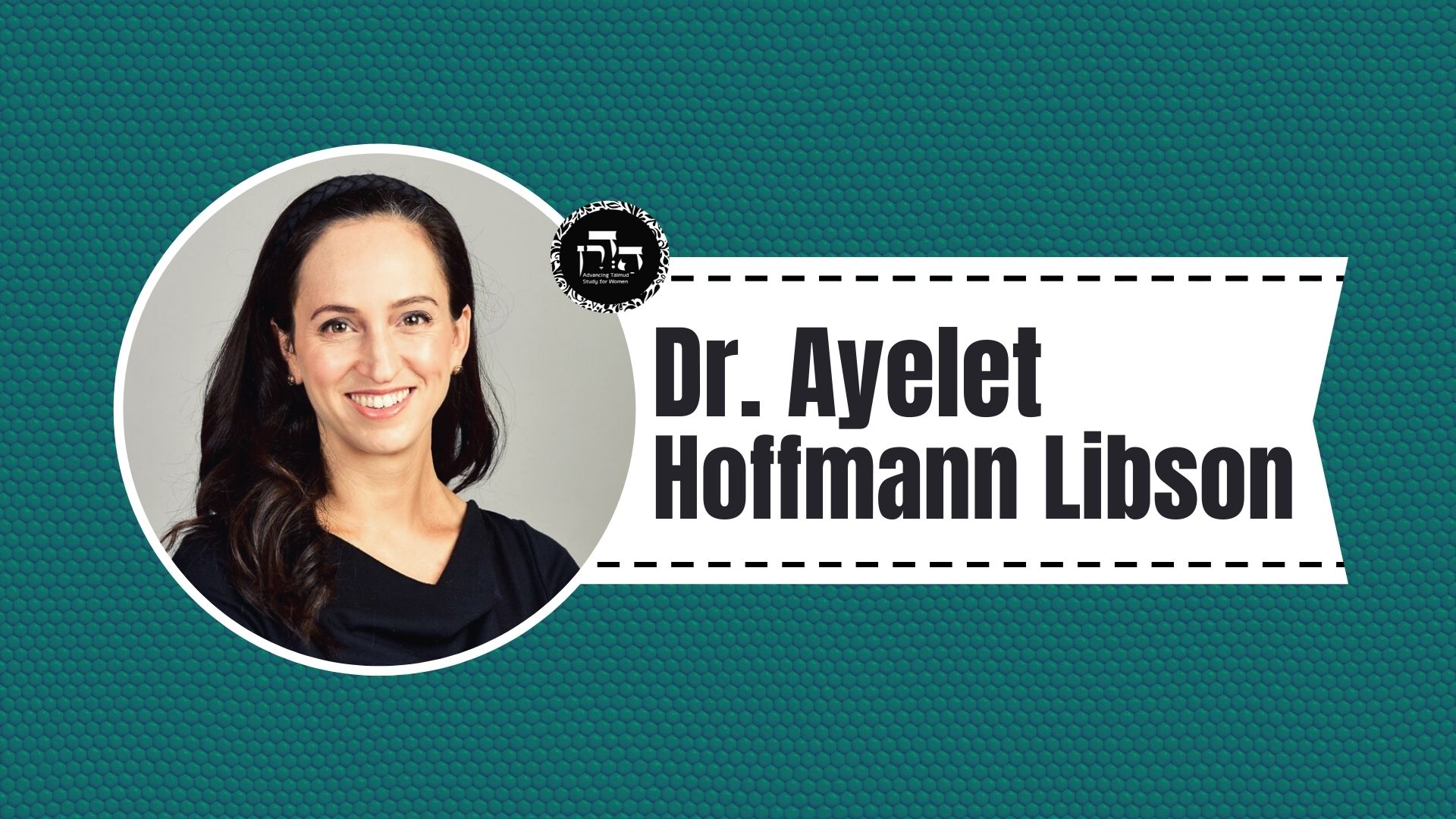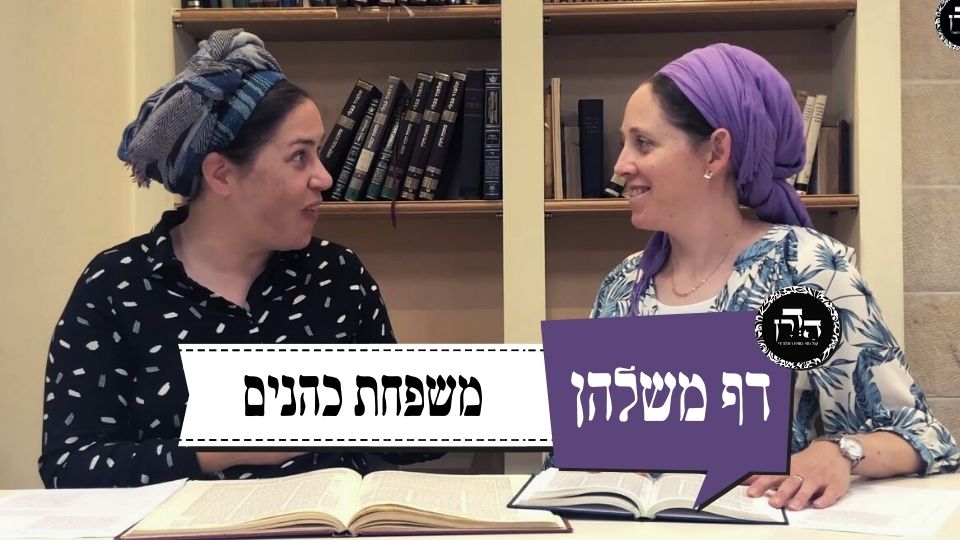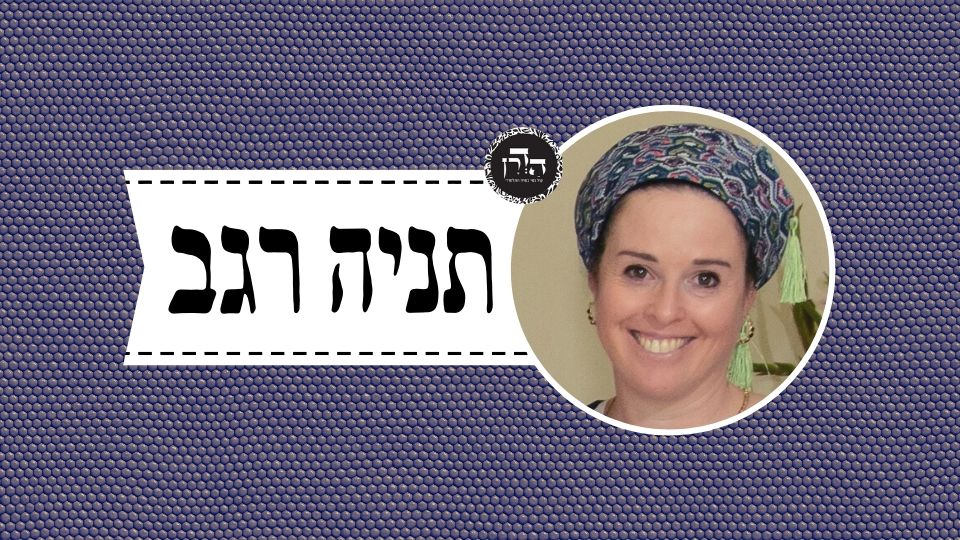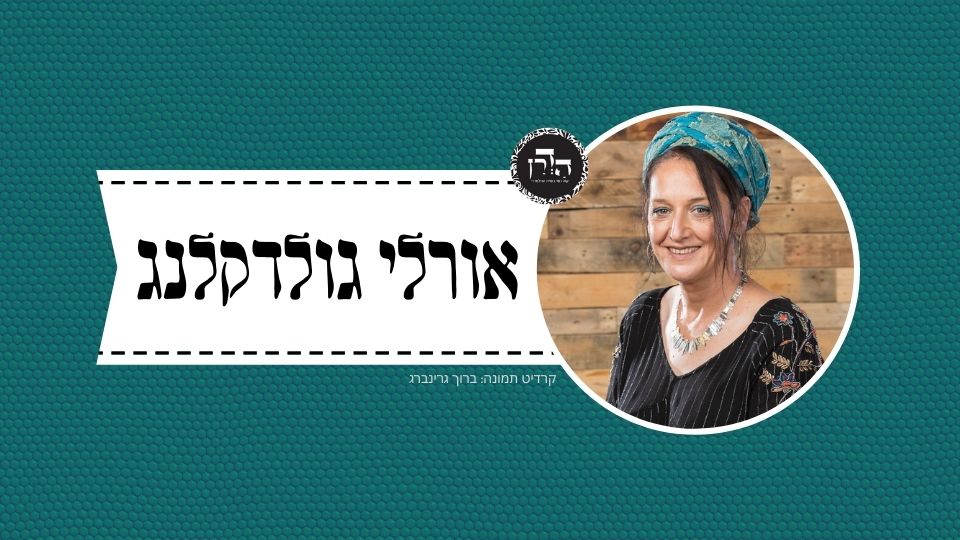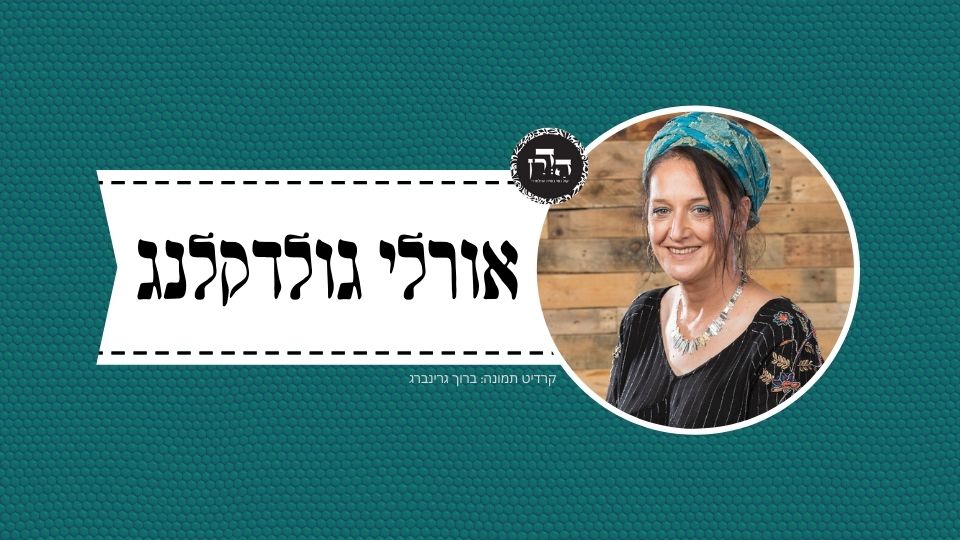יומא ו
אָמַר לָךְ: הַהוּא אַבְנֵטוֹ שֶׁל כֹּהֵן גָּדוֹל לֹא זֶה הוּא אַבְנֵטוֹ שֶׁל כֹּהֵן הֶדְיוֹט.
The Gemara answers that he could have said to you: That verse comes to teach that the belt of the High Priest is not the belt of the common priest. It is explicit in the Torah that the belt of the High Priest is made of fine blue and purple linen. On the other hand, the Torah does not state the materials used in the belt of the common priest, which was in fact linen like the rest of the garments of the common priest. And still one can say that Aaron and his sons were dressed simultaneously.
וּלְמַאן דְּאָמַר אַהֲרֹן וְאַחַר כָּךְ בָּנָיו, וְהָכְתִיב: ״וְחָגַרְתָּ אוֹתָם אַבְנֵט״! אָמַר לָךְ: הַהוּא קָא מַשְׁמַע לַן, אַבְנֵטוֹ שֶׁל כֹּהֵן גָּדוֹל זֶהוּ אַבְנֵטוֹ שֶׁל כֹּהֵן הֶדְיוֹט.
The Gemara asks: And according to the one who said that Moses dressed Aaron first and then his sons, is it not written: “And you will gird them with belts,” indicating that they were girded simultaneously? The Gemara responds that he could have said to you: That verse teaches us that the belt of the High Priest is identical to the belt of the common priest. Both of them were from fine blue and purple linen. Therefore, although the Torah distinguishes between the girding of the belts, as Moses dressed Aaron before he dressed Aaron’s sons, there was a common command to make both belts, indicating that they were made of the same material.
״וַיַּחְגּוֹר אוֹתוֹ אַבְנֵט״ ״וַיַּחְגּוֹר אוֹתָם״ לְמָה לִי? שְׁמַע מִינַּהּ אַהֲרֹן וְאַחַר כָּךְ בָּנָיו. וּבְבַת אַחַת מִי מַשְׁכַּחַתְּ לַהּ? לָא צְרִיכָא, דְּאַקְדֵּים.
The Gemara asks: If they are identical, why do I need both the verse: “And he girded him with a belt,” and the verse: “And he girded them”? The Gemara explains: Learn from it that Moses dressed Aaron first and then dressed his sons. The Gemara asks: And can you find a situation where Moses could have girded Aaron and his sons simultaneously? The Gemara explains: It is necessary only to state that Moses girded Aaron first and then proceeded to gird his sons in order of their significance. After girding Aaron he did not dress Aaron in any other garments before girding his sons.
מַפְרִישִׁין כֹּהֵן גָּדוֹל וְכוּ׳. לָמָּה מַפְרִישִׁין? לָמָּה מַפְרִישִׁין?! כִּדְקָאָמְרִינַן, אִי לְרַבִּי יוֹחָנָן כִּדְאִית לֵיהּ, אִי לְרֵישׁ לָקִישׁ כִּדְאִית לֵיהּ!
§ After a long digression in which many peripheral issues were addressed, the Gemara returns to interpreting the mishna. It was taught in the mishna: The Sages would remove the High Priest from his house to the Chamber of Parhedrin. The Gemara asks: Why do the Sages remove him? The Gemara asks in astonishment: Why do the Sages remove him? It is as we stated above: Whether it is according to Rabbi Yoḥanan, as per his opinion: Sequestering of the High Priest is derived from the sequestering prior to the inauguration; or whether it is according to Reish Lakish, as per his opinion: Sequestering of the High Priest is derived from sequestering at Sinai, the answer is clear. What is the point of the Gemara’s question?
הָכִי קָאָמַר: מִבֵּיתוֹ לָמָּה פֵּירַשׁ? תַּנְיָא: רַבִּי יְהוּדָה בֶּן בְּתִירָה אוֹמֵר: שֶׁמָּא תִּמָּצֵא אִשְׁתּוֹ סָפֵק נִדָּה וְיָבֹא עָלֶיהָ.
The Gemara explains: This is what the Gemara is saying. Why did he withdraw from his house, i.e., his wife? The Gemara explained why he must be removed to a special location; but why doesn’t his wife join him? It was taught in a baraita: Rabbi Yehuda ben Beteira says: It is due to the concern lest his wife be found to be in a situation of uncertainty as to whether or not she has the halakhic status of a menstruating woman, and he will have relations with her and become impure.
אַטּוּ בְּרַשִּׁיעֵי עָסְקִינַן? אֶלָּא: שֶׁמָּא יָבֹא עַל אִשְׁתּוֹ וְתִמָּצֵא סָפֵק נִדָּה.
The Gemara asks in astonishment: Is that to say that we are dealing with wicked people? Will the High Priest, aware of the uncertain status of his wife, have relations with her? Rather, rephrase the statement: It is due to the concern lest he have relations with his wife and then she be found to be in a situation of uncertainty as to whether or not she has the halakhic status of a menstruating woman. In a case where blood is found on the sheets after the couple engaged in relations, and there is uncertainty as to whether or not the High Priest had relations with his wife while she had the halakhic status of a menstruating woman, the status of the High Priest is one of uncertain impurity.
אַמְרוּהָ רַבָּנַן קַמֵּיהּ דְּרַב חִסְדָּא: כְּמַאן — כְּרַבִּי עֲקִיבָא, דְּאָמַר: נִדָּה מְטַמְּאָה אֶת בּוֹעֲלָהּ. דְּאִי רַבָּנַן, הָא אָמְרִי: אֵין נִדָּה מְטַמְּאָה אֶת בּוֹעֲלָהּ.
The Sages stated the following assumption before Rav Ḥisda: In accordance with whose opinion is that a reason for concern? It is in accordance with the opinion of Rabbi Akiva, who said: A menstruating woman who found blood on the sheets within twenty-fours after having relations, creating uncertainty with regard to her status when she engaged in relations, renders the man who had with relations with her retroactively impure. As, if it were in accordance with the opinion of the Rabbis, it is difficult: Didn’t they say that a woman with regard to whom there is uncertainty as to whether or not she has the halakhic status of a menstruating woman does not render the man who had with relations with her retroactively impure. Therefore, the High Priest need not leave his wife during the week prior to Yom Kippur.
אֲמַר לְהוּ רַב חִסְדָּא: אֲפִילּוּ תֵּימְרוּ רַבָּנַן, עַד כָּאן לָא פְּלִיגִי רַבָּנַן עֲלֵיהּ דְּרַבִּי עֲקִיבָא אֶלָּא בְּאַחַר אַחַר, אֲבָל בְּחַד אַחַר — מוֹדוּ לֵיהּ.
Rav Ḥisda said to the Sages: Even if you say that the mishna is in accordance with the opinion of the Rabbis, the Rabbis disagree with Rabbi Akiva with regard to retroactive impurity only in a case where blood was discovered on the sheets long afterward, after there was time for the woman to leave the bed and bathe and only then discover the blood. Due to the time that elapsed, the Rabbis hold that there is no way to prove a connection between when the woman menstruated and when they engaged in relations. However, if the blood was found merely afterward, the Rabbis concede to Rabbi Akiva that she renders the man retroactively impure.
אָמַר רַבִּי זֵירָא: שְׁמַע מִינַּהּ בּוֹעֵל נִדָּה אֵינוֹ כְּנִדָּה, וְטוֹבֵל בַּיּוֹם.
Rabbi Zeira said: Learn from it that one who is impure because he had relations with a menstruating woman is unlike a menstruating woman in terms of the time of immersion. Unlike the woman, who immerses after nightfall following the seventh day after her menstruation ceased, such a man may immerse on the seventh day and need not wait for nightfall. Therefore, if a High Priest has relations with his wife just before he is sequestered and there is uncertainty as to whether she has the halakhic status of a menstruating woman, the seventh day of his impurity occurs on Yom Kippur eve. He immerses himself that day and completes the purification process at nightfall. This allows him to enter the Temple to perform the Yom Kippur service.
דְּאִי אָמְרַתְּ בּוֹעֵל נִדָּה כְּנִדָּה, אֵימַת טָבֵיל — בְּלֵילְיָא. לִמְחַר הֵיכִי עָבֵיד עֲבוֹדָה? וְהָא בָּעֵי הֶעֱרֵב הַשֶּׁמֶשׁ. אֶלָּא לָאו שְׁמַע מִינַּהּ בּוֹעֵל נִדָּה אֵינוֹ כְּנִדָּה.
As, if you say that one who is impure because he had relations with a menstruating woman is like a menstruating woman in terms of the time of immersion, when does he immerse? He may immerse only at night after seven complete days. Since that night is Yom Kippur, how can he perform the Yom Kippur service the next day? Isn’t he required to wait for sunset following his immersion to complete the purification process? Until then his status is that of one who immersed that day, who may not serve in the Temple until the nightfall following his immersion. Rather, must one not conclude from it that one who is impure because he had relations with a menstruating woman is unlike a menstruating woman in terms of the time of immersion? He immerses on the seventh day, Yom Kippur eve, and at nightfall he may serve in the Temple.
רַב שִׁימִי מִנְּהַרְדְּעָא אָמַר: אֲפִילּוּ תֵּימָא בּוֹעֵל נִדָּה כְּנִדָּה, דְּמַפְרְשִׁינַן לֵיהּ שָׁעָה אַחַת סָמוּךְ לִשְׁקִיעַת הַחַמָּה.
Rav Shimi from Neharde’a says: Even if you say that one who is impure because he had relations with a menstruating woman is like a menstruating woman with regard to the time of immersion, the High Priest is not removed from his house at night. Rather, we sequester him one hour just before sunset on the eighth day prior to Yom Kippur, slightly before the start of the seven-day period, leaving seven full days to count prior to Yom Kippur. Although he is removed from his house more than seven days prior to Yom Kippur, that slight addition is not sufficient to have the period considered eight days.
מֵיתִיבִי: כׇּל חַיָּיבֵי טְבִילוֹת טְבִילָתָן בַּיּוֹם, נִדָּה וְיוֹלֶדֶת טְבִילָתָן בַּלַּיְלָה. נִדָּה אִין, בּוֹעֵל נִדָּה לָא!
The Gemara raises an objection to the opinion that one who is impure because he had relations with a menstruating woman immerses at night: With regard to all those obligated in immersions, their immersion is during the day. The exceptions are a menstruating woman and a woman after childbirth, whose immersion is at night. It can be learned by inference: With regard to a menstruating woman, yes, she immerses at night; with regard to one who is impure because he had relations with a menstruating woman, no, he does not immerse at night.
נִדָּה וְכׇל דְּאָתֵי מֵרִבּוּיָיא.
The Gemara rejects that proof because the term menstruating woman in that baraita includes the woman and everyone whose inclusion in the impurity is derived from her status. The understanding is that a man who has relations with a menstruating woman assumes her impurity, and therefore his immersion would be identical to hers.
מֵיתִיבִי: בַּעַל קֶרִי כְּמַגַּע שֶׁרֶץ, בּוֹעֵל נִדָּה כִּטְמֵא מֵת. מַאי לָאו לִטְבִילָה? לֹא, לְטוּמְאָתָן.
The Gemara raises another objection: The halakhic status of one who is ritually impure due to a seminal emission is like that of one who came into contact with a creeping animal, whereas the legal status of one who is ritually impure because he had relations with a menstruating woman is like that of one who became impure with ritual impurity imparted by a corpse. The Gemara asks: What, does the baraita not mean that one who had relations with a menstruating woman is like one impure with impurity imparted by a corpse in terms of immersion, which he may perform during the day? The Gemara rejects that conclusion. No, the baraita is merely comparing the duration of their impurity. One who experiences a seminal emission is impure for one day, like one who came into contact with a creeping animal; one who has relations with a menstruating woman is impure for seven days, like one impure with impurity imparted by a corpse.
טוּמְאָתָן?! בְּהֶדְיָא כְּתִיב בְּהוּ. הַאי טוּמְאַת שִׁבְעָה כְּתִיב בֵּיהּ, וְהַאי טוּמְאַת שִׁבְעָה כְּתִיב בֵּיהּ,
The Gemara wonders: For what purpose would the baraita come to teach the duration of their impurity? The Torah explicitly writes the durations of their impurity. This, one impure with impurity imparted by a corpse, has impurity of seven days written in his regard; and similarly, that, one who is impure because he had relations with a menstruating woman, has impurity of seven days written in his regard. There is no need for the baraita to derive a matter explicitly written in the Torah from another matter explicitly written in the Torah.
אֶלָּא לָאו, לִטְבִילָתָן!
Rather, must it not be that the baraita is equating them with regard to their immersion, in that both one who has relations with a menstruating woman and one impure with impurity imparted by a corpse immerse during the day?
לָא, לְעוֹלָם לְטוּמְאָתָן, סֵיפָא אִצְטְרִיכָא לֵיהּ: אֶלָּא שֶׁחָמוּר מִמֶּנּוּ בּוֹעֵל נִדָּה, שֶׁמְּטַמֵּא מִשְׁכָּב וּמוֹשָׁב בְּטוּמְאָה קַלָּה, לְטַמֵּא אוֹכָלִין וּמַשְׁקִין.
The Gemara rejects that conclusion. No; actually, the baraita is referring to the duration of their impurity. Although there is nothing novel in that equation, it was necessary for the tanna to teach the latter clause of the baraita: However, in one sense, the case of one who is impure because he had relations with a menstruating woman is more severe than one impure with impurity imparted by a corpse. One who is impure because he had relations with a menstruating woman transmits impurity through lying on a bed or sitting on a chair, even if he never came into direct contact with the chair or the bed. He renders the bed or chair impure with a mild form of impurity. He confers upon them first-degree ritual impurity status, sufficient only to render foods and liquids impure. One impure with impurity imparted by a corpse transmits impurity by means of direct contact.
תָּא שְׁמַע, דְּתָנֵי רַבִּי חִיָּיא: הַזָּב וְהַזָּבָה וְהַמְּצוֹרָע וְהַמְצוֹרַעַת וּבוֹעֵל נִדָּה וּטְמֵא מֵת טְבִילָתָן בַּיּוֹם, נִדָּה וְיוֹלֶדֶת טְבִילָתָן בַּלַּיְלָה! תְּיוּבְתָּא.
Come and hear an additional proof that Rabbi Ḥiyya taught: For the zav and the zava and the leper and the female leper, and one who had relations with a menstruating woman, and one who is ritually impure with impurity imparted by a corpse, their immersion is during the day. For a menstruating woman and a woman after childbirth, their immersion is at night. The Gemara concludes that this baraita is indeed a conclusive refutation of the opinion of Rav Shimi from Neharde’a, who said that one who is impure because he had relations with a menstruating woman immerses at night.
וְעַד שֶׁאַתָּה מַפְרִישׁוֹ מִטּוּמְאַת בֵּיתוֹ, הַפְרִישֵׁהוּ מִטּוּמְאַת הַמֵּת! אָמַר רַב תַּחְלִיפָא אֲבוּהּ דְּרַב הוּנָא (בַּר תַּחְלִיפָא) מִשְּׁמֵיהּ דְּרָבָא: זֹאת אוֹמֶרֶת: טוּמְאַת הַמֵּת הוּתְּרָה הִיא בְּצִיבּוּר.
With regard to the sequestering of the High Priest, the Gemara asks: And before you remove him from the potential of impurity of his house, remove him from the potential of the more severe impurity imparted by a corpse. The Sages should have instituted an ordinance prohibiting visitors to the High Priest lest one die while in his chamber and render him impure. Rav Taḥlifa, father of Rav Huna bar Taḥlifa, said in the name of Rava: That is to say that impurity imparted by a corpse is permitted in cases involving the public. In cases where the public is involved, impurity imparted by a corpse does not prevent the Temple service from being conducted. Since the service of the High Priest on Yom Kippur is a service involving communal offerings, impurity imparted by a corpse does not invalidate the service.
רָבִינָא אָמַר: אֲפִילּוּ תֵּימָא טוּמְאַת הַמֵּת דְּחוּיָה הִיא בְּצִבּוּר. טוּמְאַת הַמֵּת לָא שְׁכִיחָא, טוּמְאַת בֵּיתוֹ שְׁכִיחָא.
Ravina said: Even if you say that impurity imparted by a corpse is merely overridden in public and not completely permitted, the idea that the High Priest is not removed from the potential of impurity imparted by a corpse can be understood. Impurity imparted by a corpse is uncommon. The likelihood that one visiting the High Priest will suddenly die is minimal. In contrast, impurity of his house is common, as uncertainty with regard to his wife’s status as a menstruating woman could arise at any moment.
אִיתְּמַר, טוּמְאַת הַמֵּת, רַב נַחְמָן אָמַר: הוּתְּרָה הִיא בְּצִיבּוּר, וְרַב שֵׁשֶׁת אָמַר: דְּחוּיָה הִיא בְּצִיבּוּר.
There is an amoraic dispute with regard to the effect of impurity imparted by a corpse on the conduct of the Temple service. It was stated with regard to impurity imparted by a corpse that Rav Naḥman said: It is permitted in cases involving the public; e.g., when a majority of the Jewish people is impure, the service of a ritually pure priest is not preferable to that of an impure priest. The Temple service proceeds as though there was no impurity at all. And Rav Sheshet said: Impurity imparted by a corpse is merely overridden in cases involving the public, and service performed by a ritually pure priest is preferable.
הֵיכָא דְּאִיכָּא טְמֵאִין וּטְהוֹרִין בְּהָהוּא בֵּית אָב — כּוּלֵּי עָלְמָא לָא פְּלִיגִי דִּטְהוֹרִין עָבְדִי, טְמֵאִין לָא עָבְדִי. כִּי פְּלִיגִי לְאַהְדּוֹרֵי וּלְאֵתוֹיֵי טְהוֹרִין מִבֵּית אָב אַחֲרִינָא.
The Gemara restricts the scope of the dispute. In a case where there are both ritually impure and pure priests in that patrilineal family tasked with serving in the Temple on that day, everyone, even Rav Naḥman, agrees that the pure priests serve and the impure priests do not serve. When they disagree, it is with regard to a case where the entire patrilineal family is impure. Is it necessary to seek out and bring pure priests from a different patrilineal family belonging to the same priestly watch, who are tasked with serving in the Temple on a different day that week?
רַב נַחְמָן אָמַר: הֶיתֵּר הִיא בְּצִיבּוּר, וְלָא מַהְדְּרִינַן. וְרַב שֵׁשֶׁת אָמַר: דְּחוּיָה הִיא בְּצִיבּוּר, וּמַהְדְּרִינַן.
Rav Naḥman said: The prohibition against performing the Temple service in a state of impurity imparted by a corpse is permitted in cases involving the public, and we do not need to seek out other priests. Since the Torah permitted the performance of the Temple service by priests impure with impurity imparted by a corpse, it is completely permitted and it is as though the service is performed in purity. Rav Sheshet said: The prohibition of impurity imparted by a corpse is overridden in cases involving the public, and wherever possible we seek out ritually pure priests.
אִיכָּא דְּאָמְרִי: אֲפִילּוּ הֵיכָא דְּאִיכָּא טְהוֹרִין וּטְמֵאִין בְּהָהוּא בֵּית אָב פְּלִיג רַב נַחְמָן, וְאָמַר: עָבְדִי נָמֵי טְמֵאִין,
Some say that the dispute is slightly different: Even in a case where there are both ritually pure and ritually impure priests in that patrilineal family, Rav Naḥman disagreed with Rav Sheshet and said that the priests serve even when they are impure,

